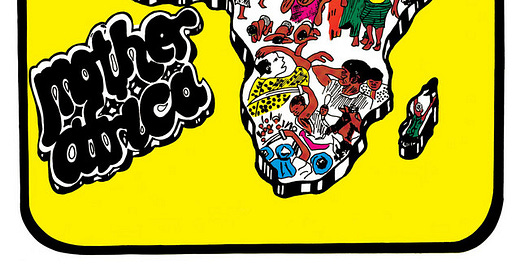Genre of the Day - Jùjú
Album of the Day - Mother Africa by The Lijadu Sisters (1977)
August 27, 2024
Over a bewildering and draining few weeks, it’s been quite the uphill journey to try to reground myself and continue to dig into my passions. Though I still love getting to sit down at the end of the day, learn about music, and sharpen the old writing chops, sometimes I’m all there and others I’m not. In a few recent articles, I’ve reflected on my history as a music lover such as rediscovering Greensleeves, which was the first melody to catch me as a child. Today’s genre reminded me of a key moment that brought me to this blog. I discovered Pitchfork my senior year of high school and quickly became hooked. I loved its deep-dive inquiries into both familiar and unfamiliar albums and its writers’ clever, inventive ways of painting music. I loved that it was unafraid to upend the perspectives of other outlets while faithfully researching every component of a story to a T. Its Sunday reviews delve into a historically significant album, and I distinctly remember reading their review of King Sunny Adé’s landmark Juju Music during a phase when I felt compelled to expand my musical horizons. I had no idea that years later I’d undertake trying to do that every single day, but this full-circle moment reminds me of how far I’ve come. I’ve been talking a lot about myself recently on here—don’t worry, I also keep a journal—but if music’s taught me anything, it’s about the beauty of transcribing personal experiences into art.
Today’s genre is only our second musical excursion to Nigeria, and the first that is not inextricably and messily linked to the country’s rival of South Africa. By another uncanny coincidence, the artist featured in that post stopped by my city tonight! Jùjú is a gleaming jewel in the crown of Yoruba culture’s centuries of history, splendidly shining in Nigeria’s most culturally and economic city, Lagos. Yoruba culture often centers around regality and tradition, and royal practices continue to carry great import. It comes as a surprise, then, that despite the rich and robust social and royal histories in Yoruba culture, one of the biggest Yoruba musical phenomena seems so difficult to trace. Though its history is nebulous, jùjú’s name is already evocative. Yoruba is a tonal language, and the accents in jùjú are indicative of a falling and rising tone, respectively; within the music’s subtext, the up-and-down lilt of the word itself is a mirror into the rhythmic depth driving the genre.
Though jùjú music is a 20th-century innovation growing out of urban Yoruba centers, it was musically preceded by some of the most impressive percussive traditions bridging human speech and musical expression à la Hmong folk music in the form of talking drums. Through a variety of timbres and sonic weights, dual-sided drums articulate Yoruba words—a considerable feat considering the necessity of conveying tones alongside syllables and consonants—through a variety of rhythmic lines ranging from 12/8 to 4/4/ time. Starting in the 1920s, jùjú arose as an interpretation of worldwide and regional popular music strands buttressed by these unmistakably Yoruba rhythmic traditions. Jùjú began to uniquely champion the steel guitar, entering another electrifying chapter into the continent-wide love affair with stretching the guitar to every conceivable end.
Though it was partly Island Records hoping to vault jùjú into the rarefied trans-continental success of reggae, King Sunny Adé titling his 1982 effort Juju Music was no understatement, as his cultivation of the genre singlehandedly crystallized its vision more visibly than any other artist. Nonetheless, I can’t bow to the king in today’s column, as I’ve already listened to that album—a rare instance. Instead, we’re indulging in the Lijadu Sisters, a pair of sisters dubbed “rock & roll as fuck” by Ghanaian-American sensation Amaarae who cited them as a major inspiration. Though they worked with a wider array of sounds than King Sunny Adé, the Lijadu Sisters’ Mother Africa remains a jùjú triumph and watershed moment for women in African pop. “Osupa I,” which circles back by the closer, is a stunning introduction to the twirling, twisting feel of the talking drums and the rhythms only they can provide made all the more jubilant by their generous harmonies and buoyant guitar. “Bayi L’ense” is a more funk-indebted number lent a gripping glory by the electric guitar solo, and “Dibe Nuwa” shines as a moment of levity underscored by chirpy guitar and unrelenting drumming. It’s only fitting that a pair of twins completes the twin syllables of jùjú so perfectly in their unparalleled synergy with each other and with jùjú’s variegated layers of sound.





